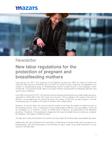
New labor regulations for the protection of pregnant and breastfeeding mothers
Law 1822 of January 04, 2017: through this law the following amendments are made: Maternity leave, regulated in Article 236 of the CST, goes from fourteen (14) to eighteen (18) weeks at the time of delivery, remunerated with the salary earned by the worker at the time her leave begins. It will be increased by two (2) weeks in the case of mothers with multiple births.
However, it must be taken into account that the worker must enjoy the weeks of maternity leave in the following manner: One (1) week prior to the probable date of delivery -duly accredited-, which will be mandatory, or a maximum of two (2) weeks prior to delivery, as prescribed by the attending physician. Therefore, in the postpartum stage she will enjoy the weeks that are missing to complete the eighteen (18) weeks of maternity leave.
The spouse or permanent partner will continue to have eight (8) working days of paid paternity leave.
Additionally, the law emphasizes the prohibition of dismissing a female worker due to pregnancy or breastfeeding, with the authorization of the Ministry of Labor, which must certify that there is a just cause for the dismissal.
The Ministry of Labor must certify that there is just cause for dismissal. In the event that the worker is dismissed without such authorization, she will be entitled to the additional payment of an indemnity equivalent to sixty (60) working days, in addition to the indemnities and benefits payable, plus the payment of the weeks of maternity leave not taken.
Law 1823 of January 04, 2017: the purpose of this regulation is to adopt the strategy called "Salas Amigas de la Familia Lactante del Entorno Laboral", mandatory for private companies with capital equal to or greater than 1,500 minimum wages or those with lower capital, but with more than 50 workers. These companies must provide in their facilities a space for breastfeeding women to express and preserve breast milk during the working day, to later transport it home and use it to feed the baby in the temporary absence of the mother. These facilities must be made under the specifications provided by the Ministry of Health and Social Protection within a period of six months. This will not exempt the employer from its obligation to guarantee the mother an hour of breastfeeding, being able to travel to her place of residence or to exercise it at her workplace.
Private companies with more than 1000 employees will have two (2) years to make the necessary physical adaptations. Companies with less than 1000 employees will have five (5) years for these adaptations.


